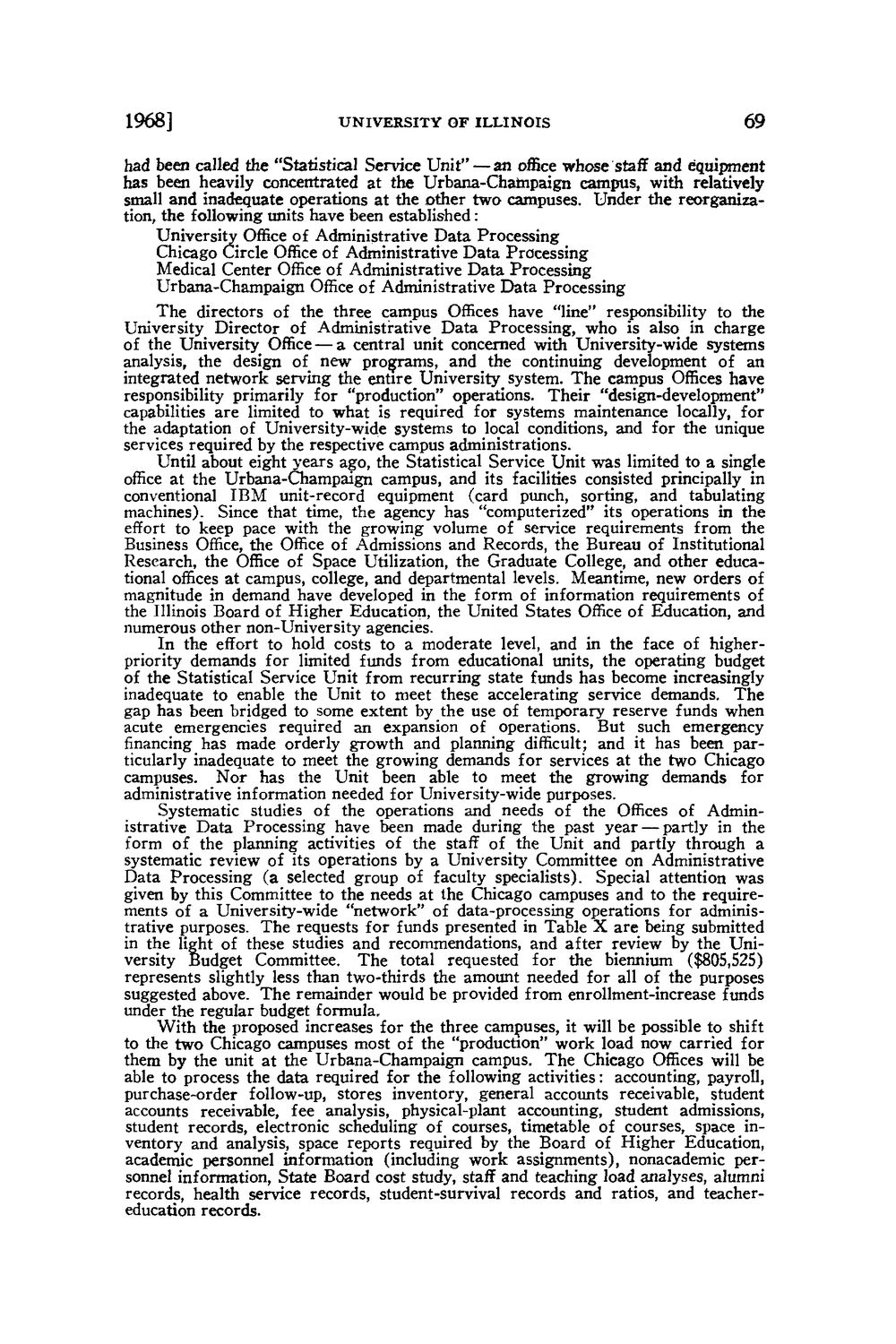| |
| |
Caption: Board of Trustees Minutes - 1970
This is a reduced-resolution page image for fast online browsing.

EXTRACTED TEXT FROM PAGE:
1968] UNIVERSITY OF ILLINOIS 69 had been called the "Statistical Service Unit" — an office whose staff and equipment has been heavily concentrated at the Urbana-Chatnpaign campus, with relatively small and inadequate operations at the other two campuses. Under the reorganization, the following units have been established: University Office of Administrative Data Processing Chicago Circle Office of Administrative Data Processing Medical Center Office of Administrative Data Processing Urbana-Champaign Office of Administrative Data Processing The directors of the three campus Offices have "line" responsibility to the University Director of Administrative Data Processing, who is also in charge of the University Office — a central unit concerned with University-wide systems analysis, the design of new programs, and the continuing development of an integrated network serving the entire University system. The campus Offices have responsibility primarily for "production" operations. Their "design-development" capabilities are limited to what is required for systems maintenance locally, for the adaptation of University-wide systems to local conditions, and for the unique services required by the respective campus administrations. Until about eight years ago, the Statistical Service Unit was limited to a single office at the Urbana-Champaign campus, and its facilities consisted principally in conventional I B M unit-record equipment (card punch, sorting, and tabulating machines). Since that time, the agency has "computerized" its operations in the effort to keep pace with the growing volume of service requirements from the Business Office, the Office of Admissions and Records, the Bureau of Institutional Research, the Office of Space Utilization, the Graduate College, and other educational offices at campus, college, and departmental levels. Meantime, new orders of magnitude in demand have developed in the form of information requirements of the Illinois Board of Higher Education, the United States Office of Education, and numerous other non-University agencies. In the effort to hold costs to a moderate level, and in the face of higherpriority demands for limited funds from educational units, the operating budget of the Statistical Service Unit from recurring state funds has become increasingly inadequate to enable the Unit to meet these accelerating service demands. The gap has been bridged to some extent by the use of temporary reserve funds when acute emergencies required an expansion of operations. But such emergency financing has made orderly growth and planning difficult; and it has been particularly inadequate to meet the growing demands for services at the two Chicago campuses. Nor has the Unit been able to meet the growing demands for administrative information needed for University-wide purposes. Systematic studies of the operations and needs of the Offices of Administrative Data Processing have been made during the past year — partly in the form of the planning activities of the staff of the Unit and partly through a systematic review of its operations by a University Committee on Administrative Data Processing (a selected group of faculty specialists). Special attention was given by this Committee to the needs at the Chicago campuses and to the requirements of a University-wide "network" of data-processing operations for administrative purposes. The requests for funds presented in Table X are being submitted in the light of these studies and recommendations, and after review by the University Budget Committee. The total requested for the biennium ($805,525) represents slightly less than two-thirds the amount needed for all of the purposes suggested above. The remainder would be provided from enrollment-increase funds under the regular budget formula. With the proposed increases for the three campuses, it will be possible to shift to the two Chicago campuses most of the "production" work load now carried for them by the unit at the Urbana-Champaign campus. The Chicago Offices will be able to process the data required for the following activities: accounting, payroll, purchase-order follow-up, stores inventory, general accounts receivable, student accounts receivable, fee analysis, physical-plant accounting, student admissions, student records, electronic scheduling of courses, timetable of courses, space inventory and analysis, space reports required by the Board of Higher Education, academic personnel information (including work assignments), nonacademic personnel information, State Board cost study, staff and teaching load analyses, alumni records, health service records, student-survival records and ratios, and teachereducation records.
| |